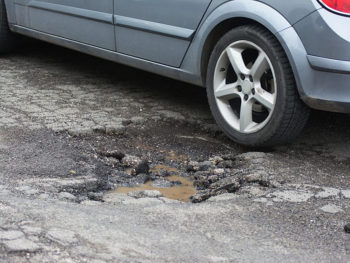Plight of UK’s roads revealed for National Pothole Day
Bringing the UK’s local road conditions up to scratch requires a £15bn investment over the next decade to ensure potholes are prevented from forming in the first place.

The AIA says an extra £1.5bn is needed per year for the next decade to bring local road conditions up to a level from which they can be maintained cost effectively going forward
So says the campaign group, the Asphalt Industry Alliance, as today (15 January) marks National Pothole Day 2020; an event intended to raise awareness of the condition of the nation’s roads and the need for government intervention to tackle the growing pothole crisis.
Although the Conservative party promised to spend £2bn on “the biggest ever pothole-filling programme” if it got into power at the last election – while new technologies are cutting the cost and time taken with repairs – various organisations including the AIA have said that investment in effective road maintenance is needed to improve the condition of the roads overall.
According to the AIA, more than £1bn has been spent on chasing and filling potholes over the last decade, while research published by the Local Government Association last year found the money that councils have been forced to cut from road maintenance funding since 2010 could have paid for the repair of nearly eight million potholes.
AIA chair, Rick Green said: “It’s promising that the new Government has recognised the need to ramp up spending on infrastructure in general, but this must include properly funding the maintenance of existing transport networks, such as our vital local roads, just as much as on headline-grabbing new schemes.
“We’ve been calling for £1.5bn extra per year for the next 10 years to bring local road conditions up to a level from which they can be maintained cost effectively going forward. This investment would be a really sensible allocation of part of the £100bn five-year pot being pledged by Government and it would be really remiss if local roads, on which we all depend, were left out.”
RAC breakdown data released to coincide with National Pothole Day reinforces the need for action on road quality, with RAC patrols having attended 20% more pothole breakdowns in Q4 2019 compared to the same period a year earlier; on average RAC patrols attend one pothole-related breakdown every hour.
And the RAC’s Pothole Index, developed to provide an accurate long-term indicator of the health of the UK’s roads, suggests the widespread problem of potholes and poor-quality roads remains as the Index currently stands at 1.7. This is down from 1.8 in the third quarter of 2019 but still means drivers are 1.7 times more likely to break down as a result of pothole-related damage than they were back in 2006 when the RAC first started collecting data. And the organisation is concerned that the inevitable arrival of colder conditions in the next few months will likely trigger a widespread outbreak of yet more potholes.
RAC head of roads policy Nicholas Lyes said: “We anticipate the Government will pledge further funds to help cash-strapped councils mend potholes in the March Budget, but such pledges are only chipping away at the problem, and they’re unfortunately not addressing the root cause of why so much of the UK is still characterised by crumbling road surfaces.
“What we need is for central Government to think differently about how councils are funded to maintain the roads under their control. Short-term commitments of cash, while welcome, are not enough on their own – councils need the security of long-term funding so they can plan proper preventative road maintenance.”
The Transport Committee also set out the need for long-term funding in its Local roads funding and maintenance: filling the gap report, published in July and highlighting that the extreme state of disrepair of the English local road network will only be sorted by a ‘front-loaded’ five-year funding settlement.
In the government response, the Department for Transport said it would put pressure on the Treasury for a longer-term funding settlement in the next Spending Review.
TRL, a global centre for innovation in transport and mobility, has also commented on the need for proactive action to prevent potholes in the first place.
A company spokesperson said: “While it is essential to repair potholes to keep road users safe, they remain only a symptom of various underlying causes. Experts at TRL suggest that engineers and authorities must look at solving the causes of potholes, rather than treating the symptom.
“Many factors can cause road surface deterioration, such as increasing numbers of vehicles on the road, rising consumer demand and the strain on the freight sector with the advent of online delivery services.
“Well-engineered, regularly maintained road surfaces and the use of quality materials is the only way to defeat the notorious pothole. Strategies that focus on proper maintenance of road surfaces before they deteriorate would prevent a huge number of defects seen on our roads.”
One long-term funding solution proposed by various organisations, including the RAC, is using part of the existing funds from fuel duty to focus solely on local road maintenance.
RAC head of roads policy Nicholas Lyes explained: “From this year, the money raised from vehicle excise duty in England will be ring-fenced to help fund motorways and major A-roads over successive five-year periods. But as yet, there is no similar model for local roads where the vast majority of drivers begin and end their journeys. We believe this could easily be changed by ring-fencing 2p a litre from existing fuel duty revenue to generate £4.7bn of additional funding over five years.”
He added: “Pothole-free roads shouldn’t be a ‘nice to have’ in 2020, drivers should surely be able to expect the vast majority of roads they drive on to be of a good standard, especially given they pay around £40bn in motoring-related tax every year.”












